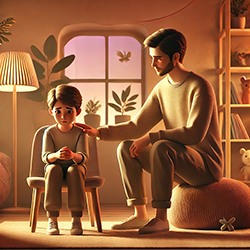Understanding childhood anxiety and knowing how to support your child through it is essential for their emotional and mental health. In this blog, we’ll explore what childhood anxiety is, its causes, signs to look for, and effective strategies to help your child manage and overcome it.
What Is Childhood Anxiety?
Childhood anxiety is an intense and persistent worry or fear that interferes with a child's normal activities. While it’s normal for children to feel anxious about certain situations—like the first day of school or a doctor's visit—children with anxiety disorders experience these feelings more frequently and more intensely. Anxiety can manifest in various ways, from separation anxiety in younger children to social anxiety, generalized anxiety, and specific phobias in older kids.
Causes of Childhood Anxiety
Genetics: Children with a family history of anxiety or other mental health conditions may be more predisposed to developing anxiety themselves.
Environmental Stressors: Significant life changes, such as moving to a new home, parental divorce, or the loss of a loved one, can trigger anxiety in children.
Personality Traits: Children who are naturally more sensitive, shy, or perfectionistic may be more prone to anxiety.
Biological Factors: An imbalance in brain chemicals or an overactive fight-or-flight response can contribute to feelings of anxiety.
Parenting Style: Overprotective or overly critical parenting can increase a child's anxiety, as they may feel less capable of handling challenges on their own.
Signs and Symptoms of Childhood Anxiety
Recognizing anxiety in children can be challenging, as it often presents differently than in adults.
Physical Symptoms:
Frequent headaches or stomachaches
Fatigue or difficulty sleeping
Rapid heartbeat or shortness of breath
Sweating or trembling
Behavioral Symptoms:
Avoiding certain situations or places
Clinging to parents or caregivers more than usual
Trouble concentrating or completing tasks
Restlessness or irritability
Emotional Symptoms:
Excessive worry or fear about everyday situations
Frequent crying or emotional outbursts
Feelings of impending doom or panic
Social Symptoms:
Difficulty making friends or participating in group activities
Avoidance of social situations or school refusal
Low self-esteem or negative self-talk
How to Help Your Child with Anxiety
Supporting a child with anxiety requires patience, understanding, and a proactive approach.
Open Communication:
Encourage your child to talk about their feelings and fears. Let them know that it’s okay to feel anxious and that you’re there to support them.
Use age-appropriate language to discuss anxiety, helping them understand what they’re experiencing.
Teach Coping Skills:
Help your child learn relaxation techniques, such as deep breathing, progressive muscle relaxation, or visualization, to calm their mind and body.
Encourage mindfulness practices, like meditation or yoga, to help them stay grounded in the present moment.
Create a Safe and Predictable Environment:
Establish consistent routines, as predictability can help reduce anxiety. Knowing what to expect can make a child feel more secure.
Gradually expose your child to their fears in a controlled and supportive manner, helping them build confidence and resilience.
Model Healthy Coping Mechanisms:
Show your child how you handle stress and anxiety in your life. Children often learn by observing their parents, so demonstrating calmness and positive coping strategies can be very influential.
Encourage Healthy Lifestyle Habits:
Ensure your child gets regular physical activity, which can help reduce anxiety by releasing endorphins.
Promote a balanced diet and good sleep hygiene, as physical health is closely linked to mental well-being.
Limit Exposure to Stressors:
Monitor your child’s media consumption and limit exposure to distressing news or content that may trigger anxiety.
Help them manage academic pressures by setting realistic expectations and providing support with schoolwork.
Seek Professional Help:
If your child’s anxiety is severe or persistent, consider seeking help from a mental health professional, such as a therapist or counselor specializing in childhood anxiety.
Cognitive Behavioral Therapy (CBT) is a common and effective treatment for anxiety in children, helping them identify and challenge negative thought patterns.
Be Patient and Supportive:
Remember that overcoming anxiety is a process, and it may take time for your child to develop the skills and confidence they need.
Celebrate their successes, no matter how small, and reassure them that you’re proud of their efforts.
When to Seek Help
While mild anxiety can often be managed with the strategies mentioned above, it’s important to recognize when professional intervention may be necessary. If your child’s anxiety is interfering with their daily life, affecting their academic performance, or causing significant distress, it’s time to seek help. Early intervention can make a significant difference in helping your child learn to manage their anxiety and lead a happy, fulfilling life.




Comments (0)